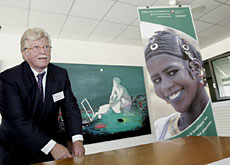“Neglected” youth to get more development aid

Switzerland is to channel more aid into lifting young people in developing countries out of poverty and to help them launch new projects.
The Swiss Agency for Development and Cooperation (SDC) said on Friday that it would direct a fifth of its resources to this population group, saying they had not received enough assistance in the past.
Addressing the SDC’s annual conference in Geneva, Swiss President Micheline Calmy-Rey said the success of future development efforts depended on engaging young people as actors and partners.
“Five of the eight Millennium Development Goals directly concern children and young people,” she said. “Unless we constantly invest in young people, we will never attain these objectives.”
According to the SDC, a fifth of the world’s population – more than 1.2 billion people – is aged between 15 and 24, with the vast majority of them living in developing countries.
The agency believes no other population group has a greater potential to have a decisive impact on global development and eradicating poverty.
Walter Fust, director of the SDC, said that while there had been a great deal of investment in infrastructure and other development projects, young people had not received the attention they deserved.
Quest for funding
The conference, which was organised in cooperation with the Swiss Coalition of Youth Organisations, heard of the difficulties faced by some young people in getting funding for smaller development projects.
Fust denied that the SDC was failing in this regard, saying it was not the size of a project but the idea that counted.
Young aid workers from Switzerland and Burkina Faso, where the Swiss has been active since 1976, also voiced concerns about corruption affecting the delivery of aid.
“Unfortunately, it is a reality and the reason why most developed countries, like Switzerland, channel aid via non-governmental organisations directly to those who need it,” Suzy Nikièma, president of the association of Burkina Faso students in Switzerland, told swissinfo.
“It’s fair to say that at government level, we have noted a fair few cases of embezzlement. Thanks to better monitoring we are on course to reducing corruption even if we are a long way from resolving this satisfactorily.”
Tackling corruption
The SDC’s director, who announced this week that he is to retire in April after almost 15 years at the helm of the agency, defended Switzerland’s record in tackling corruption.
He said the Swiss had some of the strictest monitoring systems for ensuring aid money was distributed correctly.
“We are the country that hands over the least amount of development funding to governments – and we have been criticised for this. But we do this because we can control [where the money goes] and the impact we can have.”
However, Fust conceded that development was a “risky business” and that it was impossible for every programme to run at a 100 per cent efficiency rate despite all the checks and balances.
swissinfo, Adam Beaumont in Geneva
The SDC employs around 550 people in Switzerland and abroad.
It is active in 17 countries, but will reduce its activities to 14 countries by 2010.
Its budget for 2007 amounts to around SFr1.3 billion, the equivalent of 0.4% of GNP.
The SDC and the State Secretariat for Economic Affairs (Seco) handed out SFr5,000 ($4,200) prizes at the conference to six development projects designed and launched by young people in Switzerland.
Winners of the “We care, you too?” prize included:
Arabejas Coffee: The Arabejas Association works to promote fair trade relations and transparency in international trade. It has helped smallholder cooperatives in Chiapas, Mexico, to achieve fair trade certification and to find customers in Switzerland.
Penguins4Africa: Students at the University of Bern developed a handbook to install free Linux software on computers which are then made available to young people in African countries.
Shanti: The Shanti project, launched by students at a school in Thun, has made it possible for more than 100 children of prostitutes to attend school in the West Bengali village of Changrabandh.

In compliance with the JTI standards
More: SWI swissinfo.ch certified by the Journalism Trust Initiative











You can find an overview of ongoing debates with our journalists here . Please join us!
If you want to start a conversation about a topic raised in this article or want to report factual errors, email us at english@swissinfo.ch.